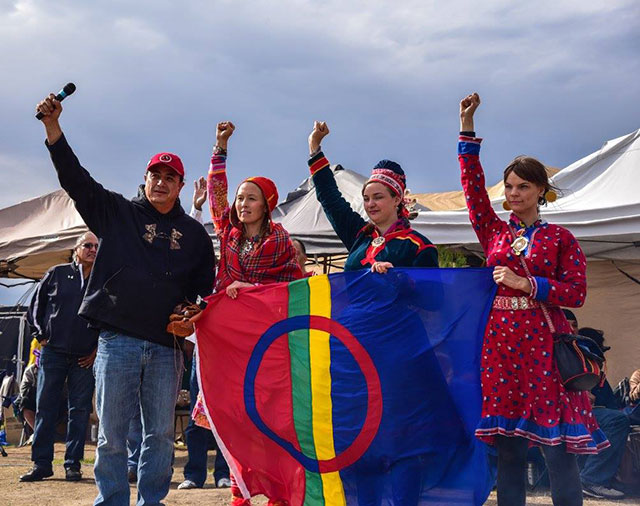
On November 8, 2016, Beaska Niillas, chairman of the Norwegian Sámi Association (NSR) walked into a conference room in Oslo, Norway, with his wife, Sara Marielle Gaup Beaska, who had spent time in Standing Rock. Both are members of the Sámi Parliament and Beaska is a member of the Norwegian Society for the Conservation of Nature. Niillas and Beaska flew over 1,000 miles from their home in Finmark, the homelands of the Indigenous Sámi people and the most northern province of Norway located above the Artic circle.
Niillas set up a meeting with executives at DNB, Norway’s largest bank, to demand that they withdraw their investment in the Dakota Access pipeline (DAPL).
“It is natural that we would try to help Standing Rock. It is easy for Indigenous people around the world to recognize the struggle. We see what they are going through and we feel it. There is no them, only us,” Niillas said in a Skype interview with Truthout.
In his hands was a 20-page report documenting the human rights abuses that members of the Standing Rock Sioux tribe and their allies have experienced at the hands of the state of North Dakota and Dakota Access LLC’s private security firm. Thousands have gathered to assist the Standing Rock Sioux tribe in protecting the area from the construction of the $3.7 billion project that would transport crude oil from the Bakken oil field in North Dakota to a refinery to near Chicago.
The story of how the Sámi received that report illustrates how international networks of Indigenous people are challenging the power structure behind the oppression of Indigenous people all around the world, Niillas said.
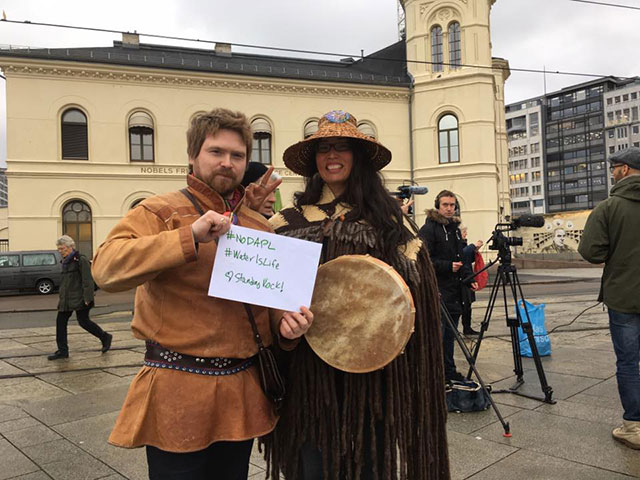 Baeska Niillas (left) at a solidarity event for the Standing Rock Tribe in Oslo, Norway. (Photo: Audrey Siegl)
Baeska Niillas (left) at a solidarity event for the Standing Rock Tribe in Oslo, Norway. (Photo: Audrey Siegl)
DNB, a direct investor and loan provider to the Dakota Access pipeline, loaned $120 million to the Bakken pipeline project and extended $460 million in credit lines to companies with ownership stakes, specifically Energy Transfer Partners, Sunoco Logistics, Phillips 66 and Marathon.
“I went to that meeting knowing that to succeed, we needed independent documentation of the human rights abuses,” Niillas said. “We needed something to convince the bank that the abuses weren’t just found on social media. Five hours before the meeting, I had the report I needed in my hands.”
That report came to Niillas unexpectedly from law school graduate Michelle Cook, who had worked at the Standing Rock camp to develop a legal infrastructure to support the tribe and its allies.
“There [were] four people, big shots in a big company,” Niillas said. “None of us knew what to expect. They seemed confident at the start and then uncomfortable as we started talking about what was happening at Standing Rock. By the end, I could see they realized the severity of the situation that they were in.”
Shortly after that meeting, on November 17, 2016, DNB sold off $3 million in assets. Although the bank is still responsible for offering the pipeline companies hundreds of millions of dollars in credit — about 10 percent of the credit needed for the project — Sámi activists are confident this is just the start of complete divestment of Nordic countries from the pipeline, and they recently scored yet another victory: On November 24, Odin Fund Management, a major fund manager in Norway, also announced that it sold $23.8 million worth of shares that were invested in the companies that are part of the Dakota Access pipeline.
The One Who Walks Around You
Four thousand miles away and one week prior to meeting with DNB, Cook was unaware of what Sámi activists were planning in Norway. A member of the Navajo Nation, an attorney, a trained human rights observer and a member of the Water Protector Legal Collective, she had to leave her legal post at the Standing Rock camp to take care of her mother who recently had a stroke.
Cook is part of the Honághááhnii Clan of the Navajo nation, which translates into the “One Who Walks Around You.” She needed to be with her mother but wished she could do something more to support the other Water Protectors while away from camp. Nearly a month before the latest brutal attack by police against unarmed people in Standing Rock on November 20, she’d felt helpless as she watched from afar on October 27 as 200 police in riot gear used pepper spray, armored vehicles, rubber bullets, stun guns and beanbag rounds to try to move people from the path of the pipeline.
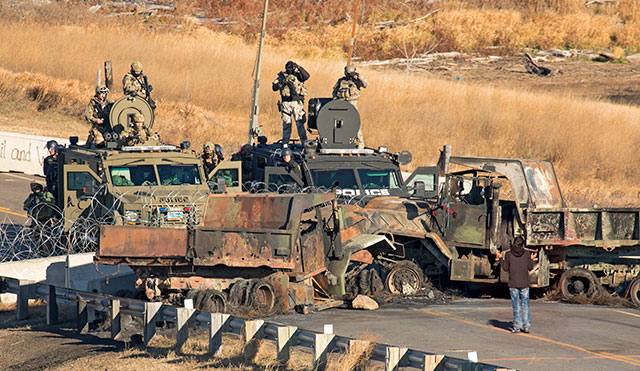 Tanks and police in North Dakota at the Standing Rock Water Protectors camp. (Photo: Pat Clayton)
Tanks and police in North Dakota at the Standing Rock Water Protectors camp. (Photo: Pat Clayton)
“All I could do at that moment was pray for Standing Rock,” Cook told Truthout. “I prayed for something I could do from where I was. I got a call from the Netherlands. A guy had found me and was asking for hard evidence of human rights abuses to start taking to banks. I had prayed out of desperation for something I could do. The Creator answered my prayer.”
Cook immediately called her team at the Water Protector Legal Collective and began working on a detailed report documenting the human rights abuses that she and others from the group had witnessed in North Dakota, including every verifiable violation from other legal observers and attorneys at camp.
“I told my friends, ‘I promise you, even if I am not there with you, we are going to come for them, and come for the people that are doing this. I will find a way to give these people a devastating blow. And if there is a way I can do it financially, than that is what I’ll do,'” Cook said.
Cook sees her report as a way to let members of the banking community know what they are supporting.
“It is a cry of desperation for the banks to pull out and divest before this results in the loss of life,” Cook said. “I do not want to have another Indian massacre in the US; I don’t want to watch people be massacred. We are trying to tell these bankers, you have to stop before this gets to a point where you can’t return from. They need to understand that is how bad it is. It is life and death right now. They have the power right now to choose life. I want them to understand the weight and consequences of their decisions. Either our people will be safe and live, or someone will die. They can prevent that.”
The Power of Transnational Indigenous Solidarity
As thousands gathered at Standing Rock in the late summer, Ellen Marie Jensen, a Sámi-American whose father emigrated from Finmark to the United States in 1965, was attending university in Tromsø, Norway, studying for her Ph.D. She had been active in Native American sovereignty rights issues for years back in Minnesota when she lived there.
“Norwegian and Sámi people settled in North Dakota and settled the lands that the [Sioux] people were removed from,” Jensen told Truthout. “We have a responsibility to help them. My people know their struggle. I am in Norway and can’t fight on the front lines, but I need to do everything I can from here.”
Jensen and many others began to organize protests at DNB bank locations and solidarity events in Norway.
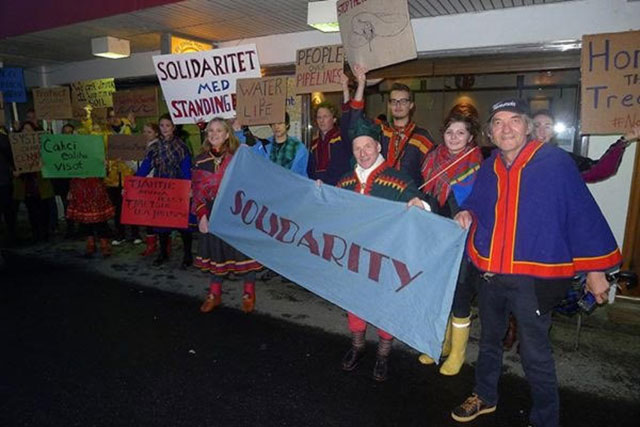 Sámi people in Tromsø, Norway hold a solidarity event on September 28, 2016. Ellen Jensen, a Sámi-American organizer, is holding the Solidarity sign on the left. (Photo: Øvind Ravna)
Sámi people in Tromsø, Norway hold a solidarity event on September 28, 2016. Ellen Jensen, a Sámi-American organizer, is holding the Solidarity sign on the left. (Photo: Øvind Ravna)
DNB began to feel pressure and released a statement in early November:
DNB is concerned about how the situation surrounding the oil pipeline in North Dakota has developed. The bank will therefore use its position as lender to the project to encourage a more constructive process to find solutions. We expect the companies and the responsible authorities to take a serious view of the situation.
Around that same time, back across the Atlantic, in the northern plains of Montana, Mike Scott, a coal organizer for the Sierra Club in the Powder River Basin, was also watching from afar — just as Cook, Jensen and Niillas had — as militarized police attacked people in North Dakota. Scott is of Sámi descent as well. His family emigrated from Norway and homesteaded in North Dakota in the early 20th century.
“I couldn’t leave my farm, but I needed to do something,” Scott told Truthout. “I thought, what can I do? I realized there were Norwegian money connections to the DAPL and I had community in Norway. That is where I could make a difference.”
Scott sent a message out to the Sámi-American Facebook group and forwarded the idea of organizing protests at Norwegian embassies in America. Jensen responded immediately and connected Scott with Niillas, whom she knew was meeting with DNB in the next couple of days.
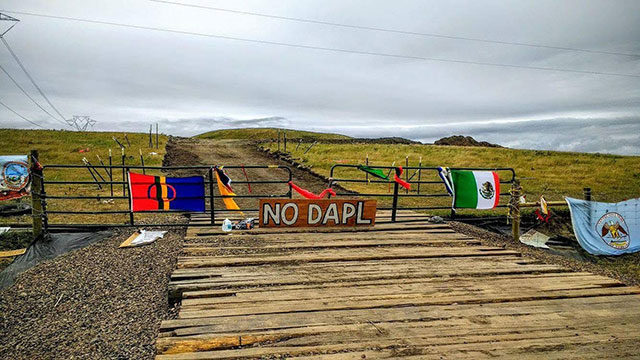 A Sámi flag hangs on the left side of a gate in the path of the proposed DAPL pipeline in North Dakota along with the flags of other tribal nations supporting the Standing Rock Sioux tribe. (Photo: J Marcangela Niva Capecchi)
A Sámi flag hangs on the left side of a gate in the path of the proposed DAPL pipeline in North Dakota along with the flags of other tribal nations supporting the Standing Rock Sioux tribe. (Photo: J Marcangela Niva Capecchi)
Niillas told Scott he needed an independent report documenting the human rights abuses happening at the camp. Scott called a friend who had been working with Cook at the Standing Rock camp with the legal team.
“Mike Scott called me and said they needed a factual, independent document detailing the human rights abuses for DNB. I couldn’t believe it. I had just finished it. I told him it’s done! It’s done!” Cook said.
Scott connected Niillas and Cook, and Niillas received the report just in time for his meeting. It documented not only the human rights violations but also the legal obligations of DNB. It also documented the international human rights laws that were being broken in North Dakota, while clearly laying out DNB’s role in the human rights violations occurring in North Dakota. The report stated:
Funding the Energy Transfer Partners affiliates and Dakota Access, thereby enabling construction of the Pipeline, implicates DNB in the ongoing violations of human rights occurring in North Dakota.
“I had only dreamed that we could get this type of documentation,” said Niillas.
Reflecting on the sequence of events that led up to the meeting in Oslo, Niillas said he believes in the power of connecting Indigenous peoples all over the globe.
“One mosquito will not bother a snake. But a thousand mosquitos will kill it,” Niillas said.
The collaboration across countries and continents ultimately achieved its goal: DNB divested from the Dakota Access pipeline.
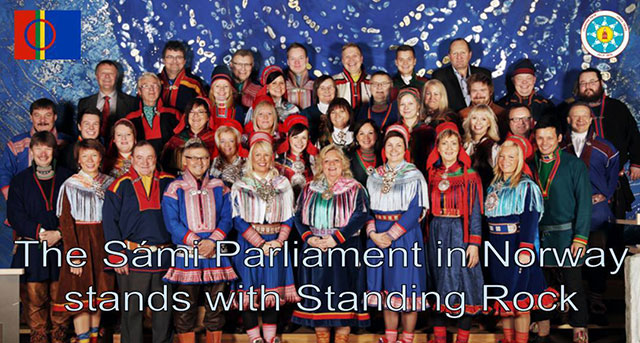 The Sámi Parliament shows solidarity with Standing Rock. (Photo: Kenneth Hætta)
The Sámi Parliament shows solidarity with Standing Rock. (Photo: Kenneth Hætta)
Getting Banks to Divest
Niillas, Cook, Jensen and Scott all believe that this first divestment is only the beginning of financial institutions pulling out of the pipeline project. They are planning to keep working together to keep the pressure on DNB and other Nordic banks that are invested in the pipeline and to force them to pull their lines of credit as well.
“When [the bank] divested, they committed themselves to a path. We will give them a little room to make the right decision and pull the credit line, but we will not back down,” Niillas said. Niillas and his wife will be traveling to Standing Rock on December 12.
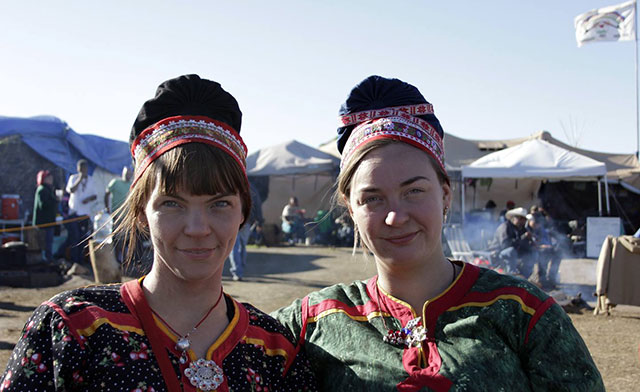 Sámi artist Sara Marielle Guap Baeska joins the Standing Rock encampment with her sister. (Photo: Jodi Troute)
Sámi artist Sara Marielle Guap Baeska joins the Standing Rock encampment with her sister. (Photo: Jodi Troute)
An international day of action is being planned for December 1. Sámi activists and their allies will hold events in the United States, Norway, Sweden and New Zealand both to celebrate DNB’s initial step and also to continue to pressure it and other Scandinavian banks to withdraw fully from the project. Scott, Jensen and Niillas are coordinating actions to target DNB directly.
“This isn’t just an issue in the US. There are a bunch of international banks invested in this thing, and they need to be held accountable for what they are doing,” Scott said. “What happened in Norway with DNB can provide a model for others. Whatever community you are in, there is power in it. We need to connect with each other.”
Jensen says the connections between people in the US with Sámi heritage and the Sámi in Norway allow for a powerful alliance that will continue to grow, supporting efforts in North Dakota and elsewhere.
“We have a profound obligation to fight with the Native Americans,” Jensen said. “The cross-Atlantic connections are being mobilized. The Nordic countries hate to look bad internationally. This is the result of dedicated work of the grassroots on the ground.”
Cook also sees this as a winning strategy and is hoping that activists, organizations and those that can’t be on the front lines will learn from what happened. Public pressure is important and sets the stage for divestment but, she says, banks have internal procedures, and legal documentation is necessary to get them to begin the process.
“They have to have hard evidence that will compel their own internal structures, their own internal policies to question and raise the suspicions enough so we can compel them to do an independent investigation. We need to provide the factual information that they need.”
Cook isn’t backing down, and she believes the work is even more important now, after watching Protectors get blasted with water in freezing temperatures this Sunday. One woman in Standing Rock was so severely injured by police that she may have to have her arm amputated.
“I want all of those bankers to know that we are going to come after you,” Cook said. “I will chase them to the ends of the Earth. We will hold them accountable. This is on them.”
Join us in defending the truth before it’s too late
The future of independent journalism is uncertain, and the consequences of losing it are too grave to ignore. We have hours left to raise the $12,0000 still needed to ensure Truthout remains safe, strong, and free. Every dollar raised goes directly toward the costs of producing news you can trust.
Please give what you can — because by supporting us with a tax-deductible donation, you’re not just preserving a source of news, you’re helping to safeguard what’s left of our democracy.